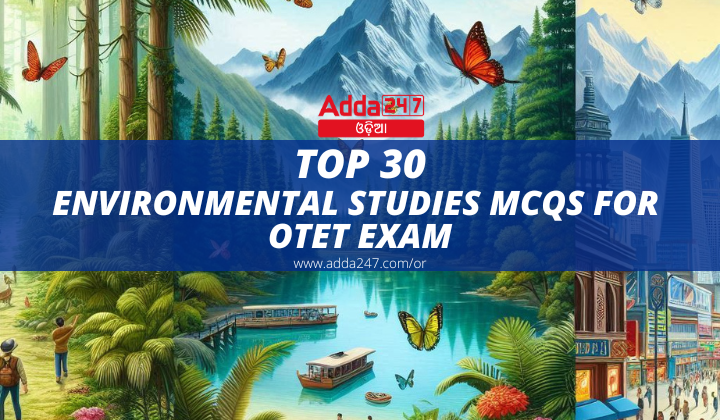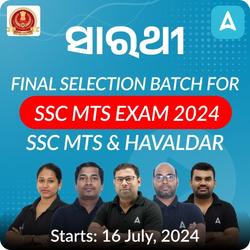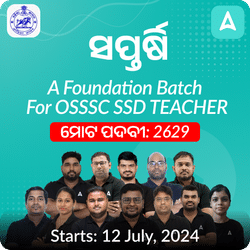The top 30 Environmental Studies MCQs for the OTET exam are tailored to help aspiring teachers grasp essential environmental concepts and issues. These questions delve into topics such as biodiversity, conservation, pollution, climate change, and sustainable development. By focusing on both theoretical knowledge and practical applications, this set of MCQs aims to equip candidates with a comprehensive understanding of environmental science, crucial for educating future generations. The carefully curated questions ensure that candidates are well-prepared to tackle the environmental studies section of the OTET exam with confidence and proficiency.
Top 30 Environmental Studies MCQS For OTET Exam
- Which principle emphasizes setting clear goals and objectives for teaching?
(a) Principle of direction
(b) Principle of readiness
(c) Principle of satisfaction
(d) Principle of attention
Ans. (a) Principle of direction - Which principle suggests that learning should involve active participation and self-activities?
(a) Principle of interest and linking with life
(b) Principle of learning by doing
(c) Principle of multi-sensory approach
(d) Principle of group dynamics
Ans. (b) Principle of learning by doing - According to which principle should teaching start with clearly defining aims and objectives?
(a) Principle of definite aim
(b) Principle of selection
(c) Principle of planning
(d) Principle of tolerance, cooperation, and praise
Ans. (a) Principle of definite aim - Which principle emphasizes the importance of understanding and accommodating individual differences among students?
(a) Principle of planning
(b) Principle of division and revision
(c) Principle of making provision for individual differences
(d) Principle of creation and recreation
Ans. (c) Principle of making provision for individual differences - Which psychological principle states that teaching should align with the mental readiness and abilities of students?
(a) Principle of satisfaction and effect
(b) Principle of attention
(c) Principle of readiness
(d) Principle of motivation
Ans. (c) Principle of readiness - According to which principle should teachers use varied stimuli to maintain student attention during teaching?
(a) Principle of motivation
(b) Principle of group dynamics
(c) Principle of attention
(d) Principle of multi-sensory approach
Ans. (c) Principle of attention - Which principle suggests that learning should be motivated and enjoyable for students?
(a) Principle of division and revision
(b) Principle of satisfaction and effect
(c) Principle of interest and linking with life
(d) Principle of tolerance, cooperation, and praise
Ans. (b) Principle of satisfaction and effect - Which teaching method involves collaborative learning among small groups of students?
(a) Differentiated instruction
(b) Flipped classroom
(c) Cooperative learning
(d) Visualization
Ans. (c) Cooperative learning - Which effective teaching strategy encourages students to learn new concepts independently at home and practice them in class?
(a) Differentiated instruction
(b) Visualization
(c) Flipped classroom
(d) Student-centric discussion
Ans. (c) Flipped classroom - Which teaching method focuses on adapting content and methods to accommodate different learning needs within a single classroom?
(a) Flipped classroom
(b) Differentiated instruction
(c) Cooperative learning
(d) Student-centric discussion
Ans. (b) Differentiated instruction - Questions are fundamental tools for assessment. Which characteristic should questions primarily possess?
a) Clarity and precision
b) Length and complexity
c) Ambiguity and subjectivity
d) Generalization and abstraction
Answer: a) Clarity and precision - What type of questions are suitable for testing understanding of concepts?
a) Essay type questions
b) Short answer questions
c) Multiple choice questions
d) True/false questions
Answer: b) Short answer questions - Which assessment tool is used to record students’ behavior in natural settings?
a) Portfolio
b) Rating scale
c) Observation
d) Anecdotal records
Answer: c) Observation - What is the primary purpose of a checklist in assessment?
a) To measure intelligence
b) To evaluate understanding
c) To record data objectively
d) To analyze documents
Answer: c) To record data objectively - Which tool is used to assess learner progress over time through a collection of their work?
a) Portfolio
b) Rating scale
c) Quiz
d) Interview schedule
Answer: a) Portfolio - Which type of questions can be answered in one word or sentence?
a) Short answer questions
b) Essay type questions
c) Objective type questions
d) Multiple choice questions
Answer: a) Short answer questions - What is the purpose of using rating scales in assessment?
a) To measure absolute knowledge
b) To rank students in order
c) To rate behavior or performance
d) To assess multiple domains
Answer: c) To rate behavior or performance - Which tool is used for assessing student performance based on documented evidence?
a) Observation
b) Checklist
c) Document analysis
d) Anecdotal records
Answer: c) Document analysis - Which assessment tool involves scoring based on predefined criteria?
a) Interview schedule
b) Rating scale
c) Rubric
d) Checklist
Answer: c) Rubric - What is the main function of quizzes and competitions in assessment?
a) To build teamwork
b) To rank students
c) To test long-term memory
d) To evaluate understanding
Answer: a) To build teamwork - Who was the first martyr of Odisha’s freedom struggle under British rule?
(a) Jayee Rajaguru
(b) Buxi Jagabandhu
(c) Mukunda Deva II
(d) Ramakrushna Samanta Singhara
Ans.: (a) Jayee Rajaguru - In which year did the Paik Rebellion take place in Odisha?
(a) 1804
(b) 1817
(c) 1827
(d) 1835
Ans.: (b) 1817 - 3. Who was the leader of the Ghumsur rebellion in 1835?
(a) Kamal Lochan Dora
(b) Buxi Jagabandhu
(c) Surendra Sai
(d) Madhaba Chandra Samantaray
Ans.: (a) Kamal Lochan Dora - Which leader from Odisha actively participated in the Sepoy Mutiny of 1857?
(a) Ramakrushna Samanta Singhara
(b) Chakhi Khuntia
(c) Surendra Sai
(d) All of the above
Ans.: (d) All of the above - Who led the Civil Disobedience Movement in Odisha in 1930?
(a) Gopabandhu Choudhury
(b) Ramakrushna Samanta Singhara
(c) Surendra Sai
(d) Madhaba Chandra Samantaray
Ans.: (a) Gopabandhu Choudhury - Which incident during the Quit India Movement in Odisha is famously known as “Rakta Tirtha”?
(a) Mathili Police Station incident
(b) Eram massacre
(c) Chandiaposi police firing
(d) Tudigadia skirmish
Ans.: (b) Eram massacre - Who was sentenced to death in 1943 in Berhampur Central Jail for his role in the Quit India Movement?
(a) Ramakrushna Samanta Singhara
(b) Laxman Naik
(c) Gopabandhu Choudhury
(d) Surendra Sai
Ans.: (b) Laxman Naik - Which leader started underground activities in Cuttack during the Quit India Movement?
(a) Gopabandhu Choudhury
(b) Ramakrushna Samanta Singhara
(c) Surendra Nath Dwivedi
(d) Chakhi Khuntia
Ans.: (c) Surendra Nath Dwivedi - Who was known as the ex-Zamindar of Balia under Jajpur Police Station, Cuttack district, and participated in the Great Revolt of 1857?
(a) Gopabandhu Choudhury
(b) Ramakrushna Samanta Singhara
(c) Dinabandhu Mohapatra
(d) Ramakrishna
Ans.: (b) Ramakrushna Samanta Singhara - Which leader was known for his resistance against British rule in Sambalpur?
(a) Chakhi Khuntia
(b) Surendra Sai
(c) Madhab Chandra
(d) Kamal Lochan Dora
Ans.: (b) Surendra Sai










